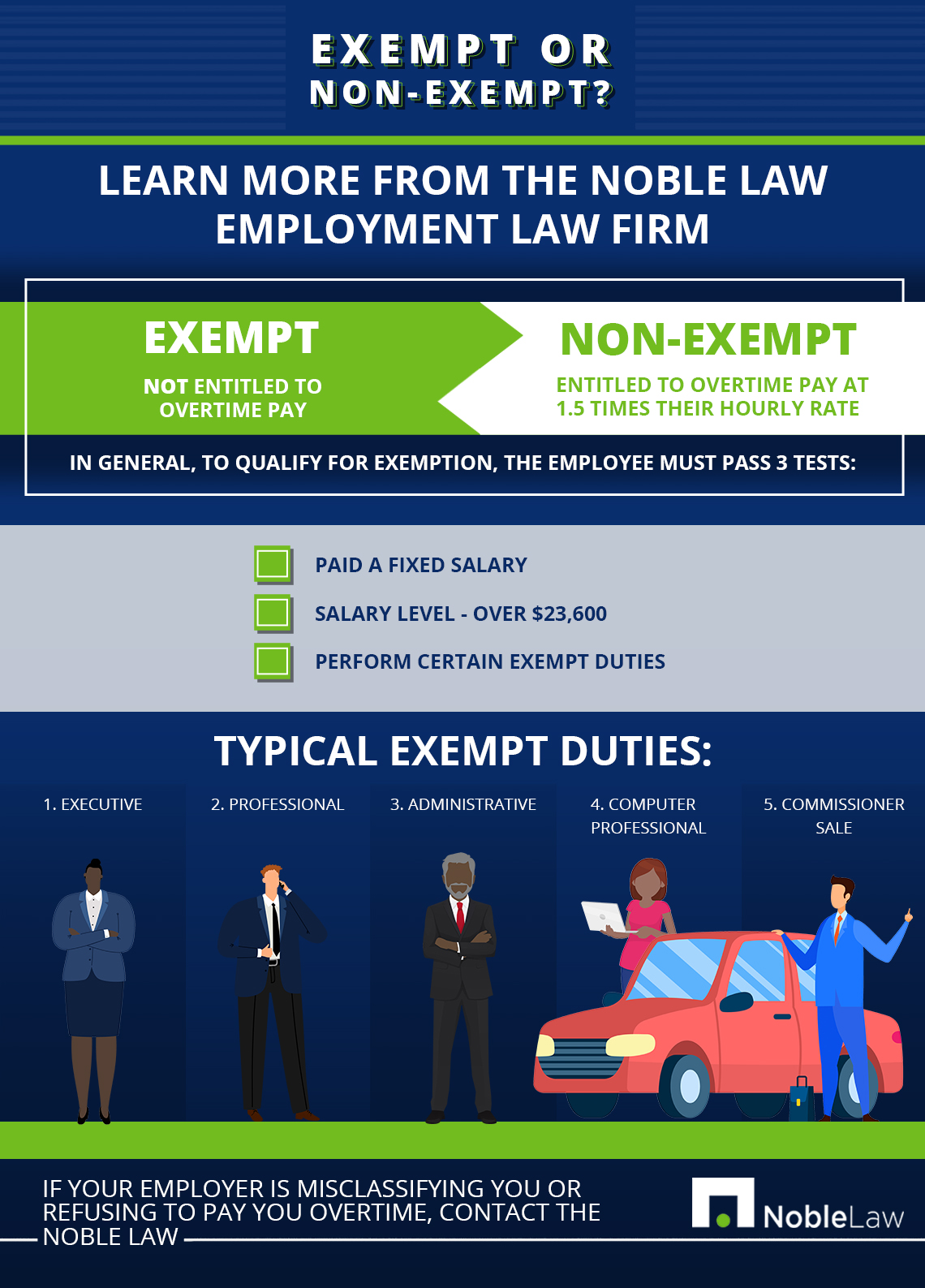Noble Law offers consultations and legal advice for a variety of employment law issues, including pay, overtime, and leave. Our employment law firm has offices in both South Carolina and the Triangle Region, and when you choose to partner with us, we will treat you as part of a team. Open communication is key to what we do, and our employment law attorneys will be supporting you every step of the way. When it comes to workplace disputes, it can be incredibly hard to speak out against your employer. Here at The Noble Law, our employment lawyers will work to understand your situation and help inform you of your legal options. Schedule a consultation with one of our employment law attorneys in South Carolina or North Carolina today.



You work hard and deserve fair compensation. However, when overtime pay or medical leave is denied, you have a robust network of state and federal statutes supporting you. They include the Fair Labor Standards Act, the North Carolina Wage & Hour Act, the Family And Medical Leave Act, the Equal Pay Act, and minimum wage laws. You have strong legal rights, and The Noble Law is here to protect them.
At our law firm, an experienced Charlotte Pay, Overtime & Leave Attorney is here to listen to your story, help you understand your options, and provide you with the strong advocacy you need to prevail.
Labor Laws in North Carolina
As noted, you have legal rights if your employer has unlawfully denied fair wages, medical leave, or overtime pay. Some of the most important laws regarding employee wages and hours include the following:
- The Federal Fair Labor Standards Act (FLSA) requires employers to pay employees overtime when they have worked more than 40 hours per week, provided those employees are not exempt from overtime laws. The FLSA also sets standards regarding tip pay, tip pooling, and other wage and hour issues.
- The North Carolina Wage & Hour Act covers many of the provisions of the FLSA but on the state level. When state and federal laws conflict, employers must adhere to the law that provides the highest standard of protection to the employee.
- The Family and Medical Leave Act (FMLA) requires employers to provide employees with unpaid, job-protected leave for specified family and medical reasons. When an employee takes FMLA leave, the employer must continue group health insurance coverage under the same terms and conditions.
- The Equal Pay Act requires employers to provide equal pay for equal work without discriminating based on gender.
- Minimum wage laws establish the lowest hourly rate at which employers are allowed to pay employees. As of 2024, the minimum wage in North Carolina is $7.25.
For workplace disputes regarding overtime or medical leave, speaking out against your employer can be challenging. Here at The Noble Law, an employment law attorney will work to understand your situation and inform you of your legal options.




How Employers Deny Wages
Employees are entitled to be properly compensated for every hour they work, and the FLSA provides remedies for employees with unpaid wages. Under its provisions, employees are classified as either “exempt” or “non-exempt,” and these classifications affect how they are paid. The NCWHA also provides remedies when employers faile to pay promised wages.
Some of the ways employers engage in wage theft include the following:
Denying Overtime Pay
The most overt way an employer denies overtime pay is to simply not pay time and a half for working over 40 hours or to coerce employees not to report those hours. If classified as a “non-exempt” employee, you are legally entitled to time and half pay for every hour you work over the 40-hour threshold.
Misclassification
If you are classified as “exempt,” your employer is not legally required to pay you overtime. However, that does not mean you do not have a valid wage and hour claim. Your employer may have misclassified you, and you could be eligible for overtime pay. The FLSA allows employees to receive back wages for up to two years, and the law also enforces penalties on employers who improperly classify their employees as “exempt.” If you believe this has happened to you, our employment lawyers can help.
Denying Pay for Prep Time
Some employers assume they do not have to pay employees for work done as pre-shift or post-shift tasks. These employers are incorrect and may violate the Fair Labor Standards Act.
Have You Been Denied Medical Leave?
Under The Family and Medical Leave Act (FMLA), employers must grant time off to eligible employees suffering from a serious health condition or caring for a family member who suffers from a medical condition. FMLA protections also apply to time off for eligible employees after the birth of a child or an adoption. It provides employees with up to 12 weeks of unpaid leave within 12 months, provided they meet the following eligibility requirements:
- The employee must have worked for their employer for at least 12 months and at least 1250 hours over the last 12 months.
- The employee must work at a location with at least 50 employees within a 75-mile radius.
If your employer has denied a valid FMLA time-off request or retaliated against you in any way for taking the leave you are legally entitled to under the law; we can help you understand your rights and options and advocate on your behalf.


Consult an Employment Lawyer at The Noble Law
Illegal and unethical workplace behaviors, like FMLA violations, marginalize employees. If you believe this has happened to you, contact an employment attorney at The Noble Law. Our law firm has offices in both North Carolina and South Carolina. Learn more about how we can help you resolve your employment law disputes. Or, feel free to visit our office location to speak with one of our attorneys in person.
Learn More
Part of our mission here at The Noble Law is educating our communities in North Carolina and South Carolina about employment law and workers’ rights. Part of our job as employment attorneys is to share our expertise with others, and we do so through educational employment law videos and our Noble Notes blog. If you’re interested in learning more about employment law regarding pay, overtime, and leave, or other issues in employment law, explore our resources below:
Along with representing clients with claims in the area of pay, overtime, and leave, we also represent employees in a variety of other areas of employment law. These include:
- Executive compensation disputes
- Workplace discrimination
- Retaliation and whistleblower law
- Workplace harassment, sexual harassment, and workplace assault
- Workplace investigations
Along with representing clients with claims of workplace harassment, sexual harassment, and workplace assault, we also represent workers in other areas of employment law. These areas include executive compensation disputes, workplace discrimination, retaliation and whistleblower protections, and pay, overtime, and leave. Learn more about our employment law firm’s Practice Areas and check out our About Page, and if you’re interested in speaking with one of our employment attorneys in North Carolina or South Carolina, contact us today.


